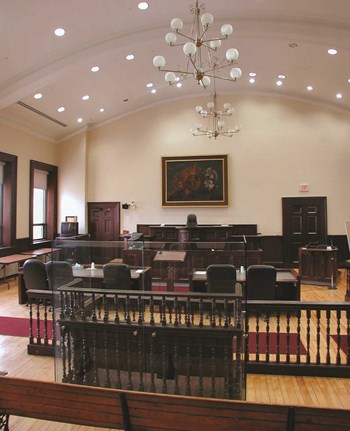
Lawsuits are usually not an association’s go-to method for dispute resolution. Expensive and time-consuming, they can quickly turn into a financial burden and may create strained relations in the community. Unfortunately, in some cases there’s no other way out. Last year, a Lakeview couple filed a suit against a neighbor, their association, individual board members, and property managers who all neglected to respond to the couple’s complaint of odors infiltrating their unit, the result of 20 cats inhabiting the neighbor’s unit below.
This may have been an extreme case but most associations will be involved in a lawsuit at some point, though the length and, certainly, the price tag may vary.
“Our firm has litigated cases that have settled right after the suit was filed and incurred only minimal expense,” says attorney Mark Roth, a principal at the law firm of Orum & Roth, LLC in Chicago. “On the other hand, we are involved in litigation that is currently 13 years old and counting, involving numerous appeals, and has been defended at a cost of over $500,000.”
Regardless of the cost or type of complaint, there are a few basic points about lawsuits that all associations should be aware of.
The Basics
Unless you live in a utopian condo association, lawsuits are bound to happen. The most common ones involve noise complaints between neighbors, construction defects in units and attempts to collect delinquent payments from residents. But how does a lawsuit begin? “A suit is initiated with the filing of a written complaint, in which the plaintiff sets forth the facts and legal theories under which he believes he or she should prevail in the suit,” explains attorney Barry Kreisler of Kreisler Law PC in Chicago.
Whether an individual files a suit against an association or an association files against a resident, doesn’t mean the case in on the express route to court. “In Illinois when a lawsuit is brought against you, you can answer the lawsuit, or you can seek to dismiss it,” explains attorney David Hartwell of the law firm of Penland & Hartwell in Chicago. “If you choose to answer it, it means the two parties are at issue. Or you can seek to dismiss it on two grounds: you can say that the pleading itself is insufficient to allege a cause of action, or you can alternatively seek to dismiss by saying by virtue of an affirmative matter, the lawsuit must be dismissed.”
Surprisingly, Kreisler says most cases are settled before the completion of a trial. “Contested litigation is quite expensive for all parties and is very time consuming. Because trial decisions can be unpredictable, most of the time litigants decide it is to their advantage to compromise their position and settle the case before the conclusion of a trial.”
Don’t Go At It Alone
Upon receiving notice of legal action against them, an individual or board may be tempted to confront the litigating party to give them a piece of their mind or attempt to resolve matters on their own, but legal experts advise against this. “The defending party should not contact the plaintiff or plaintiff’s attorney until after they have spoken with their association’s lawyer,” says Kreisler. “Instead, the defendant should immediately contact the association’s attorney for an assessment of the situation and to develop a plan of response.”
That may sound obvious, but the legal experts cannot recount how many times residents, property managers or even entire boards have tried to immediately resolve a dispute themselves, ultimately creating more legal challenges. “There are a lot of emotions surrounding lawsuits, especially when a resident names individual board members instead of just suing the association as a whole,” says Hartwell. “Board members should not discuss the lawsuit with other unit owners. They shouldn’t attempt to try a lawsuit by public opinion within the community.” In fact, the Illinois Condominium Property Act gives boards the power to meet in closed session and discuss the terms of the legal action in order to maintain confidentiality, he adds.
In addition to serving as a middleman between the two parties, “The attorney should advise the board what prospects the suit has for being successful, the potential loss or costs to the association should a judgment be entered, the costs of contesting the complaint and any options for attempting to settle the dispute prior to resolution in court. The attorney should assist the board in devising a strategy for best resolving the situation,” explains Kreisler.
Although lawsuits can take a toll on pocketbooks, associations or boards may be covered by their general liability insurance or Directors & Officers coverage, respectively. “When litigation is filed against an association, one consideration is whether the association should tender the matter to its insurance carrier. The attorney’s job is to consult with the association’s board on whether the suit should be tendered to the insurance company so that the insurance company may defend the suit. The attorney generally considers whether the particular matter at issue will most likely be covered by the insurance policy. Further consideration is given to the amount at issue in the litigation, and whether the benefits of obtaining coverage for a particular matter outweigh the burden of a poor claim history, which insurance companies consider in calculating premiums,” Roth says.
Although it is important to carefully consider if filing a claim is the best option, “If you wait too long, the insurance carrier may deny coverage on the basis that you failed to provide notice to them in a timely manner,” Hartwell says.
Whatever the course ultimately taken, in the first phases of a lawsuit, the involvement of the association attorney is crucial in steering the board or association toward a lawful and appropriate path to a resolution.
Let’s Talk Money
Lawsuits are no cheap matter, that’s a given. However, predicting the cost of a suit is difficult. “The costs are largely dependent on the actions of the other party or parties to the litigation, as well as court rulings on contested matters during the course of the litigation,” says Kreisler.
A lawsuit’s price tag may also depend on the nature of the dispute. “For example, charges of employment discrimination or harassment must first be filed with the Federal Equal Employment Opportunity Commission or the State Department of Human Rights. Those cases tend to settle relatively quickly,” says Roth. “Further, claims that may be subject to arbitration—such as cases related to construction and other contracts—are generally less costly than traditional litigation. That is due primarily to the streamlined nature of arbitration proceedings, as opposed to traditional court actions.”
Especially in today’s anxious economy, a common type of litigation is the collection of late assessment payments, which in Illinois are governed by the Illinois Forcible Entry and Detainer Act. Roth’s firm uses a fixed fee for collecting assessments. “First we issue a 30 day notice, which is required by statute and must be sent by certified mail,” he says. “We charge $180 for that notice. If the owner does to pay within those 30 days, we then file suit in the Circuit Court. Our charge for drafting and filing that complaint is $287.50, plus issuing and filing the summons. The clerk of the Circuit Court charges a $237 fee to file the complaint, in addition to a $60 per summon fee from the sheriff.”
This fee assessment is just a small sampling of the possible charges that can accrue when collecting delinquent payments, but total attorney’s fees and costs can easily be in the range of $1,500 to $2,000, says Kreisler. It is no wonder many associations are hesitant to litigate, especially if multiple owners are delinquent.
Any Alternatives?
If lawsuits were the only—or even the best—way of settling disputes, associations and residents would quickly go bankrupt. Fortunately, there are alternatives that exist even before formal legal action is taken. According to Hartwell, “The parties themselves can always engage in informal mediation, which is nothing more than a meeting with each other. The purpose being to determine where they can disagreements, where they agree, and if a compromise can be achieved, Oftentimes you can get a quicker, more cost-effective resolution through mediation. You can also find mediators who have specific expertise in different technical issues, and you are not just tossing up before a judge, who may not have a lot of experience with that issue.”
Parties can meet on their own, even without the presence of an attorney, but recently many residents and associations seek the guidance of mediation experts, who serve as a kind of neutral buffer and offer constructive methods to reaching compromise. Hartwell adds that many community declarations now require parties to engage in mediation before a lawsuit can be filed. “If such provisions exist in the declaration and someone tries to follow a lawsuit without seeking mediation, you may be able to dismiss the case,” he says.
The Cost of Constant Litigation
While the occasional lawsuit will not cripple an association, a long history of litigation may hurt a community’s standing with prospective buyers and lenders. According to Kreisler, “Section 22.1 of the Illinois Condominium Property Act requires that an owner obtain from the association certain disclosures with regard to the association. These required disclosures would include a Statement of Financial Condition, which obviously will have been adversely affected by the costs of ongoing litigation, and another statement as to the status of any pending suits or judgments to which the association is a party.” Seeing an association deeply indebted by litigation, may prompt prospective buyers to question the association’s financial stability, in addition to its community relations in general: if there are constant lawsuits, might the board be ruling ineffectively? Are there hostile relations between the board and residents, or among residents themselves?
Lenders take a particularly dim view of any type of litigation, says Roth. “All lenders require that the association disclose whether it is involved in litigation, whether as a plaintiff or a defendant. The lender will not loan money to purchase or refinance condominium units unless the lender is satisfied that the litigation does not pose a risk to the lender. Lenders generally look to whether the litigation relates to the structural integrity of the building, and whether any insurance will ultimately cover any damages in the lawsuit. Litigation definitely impacts the ‘saleability’ of units,” he says.
Lawsuits can be an expensive and time-consuming experience for residents and associations alike. Though pursing mediation prior to filing can produce cheaper and quicker results, it might not work for all complaints. Should you find yourself involved in a lawsuit, seek counsel of the association’s attorney who can help you determine the best legal route to pursue.
Maggie Puniewska is a freelance writer and a frequent contributor to The Chicagoland Cooperator.






Leave a Comment